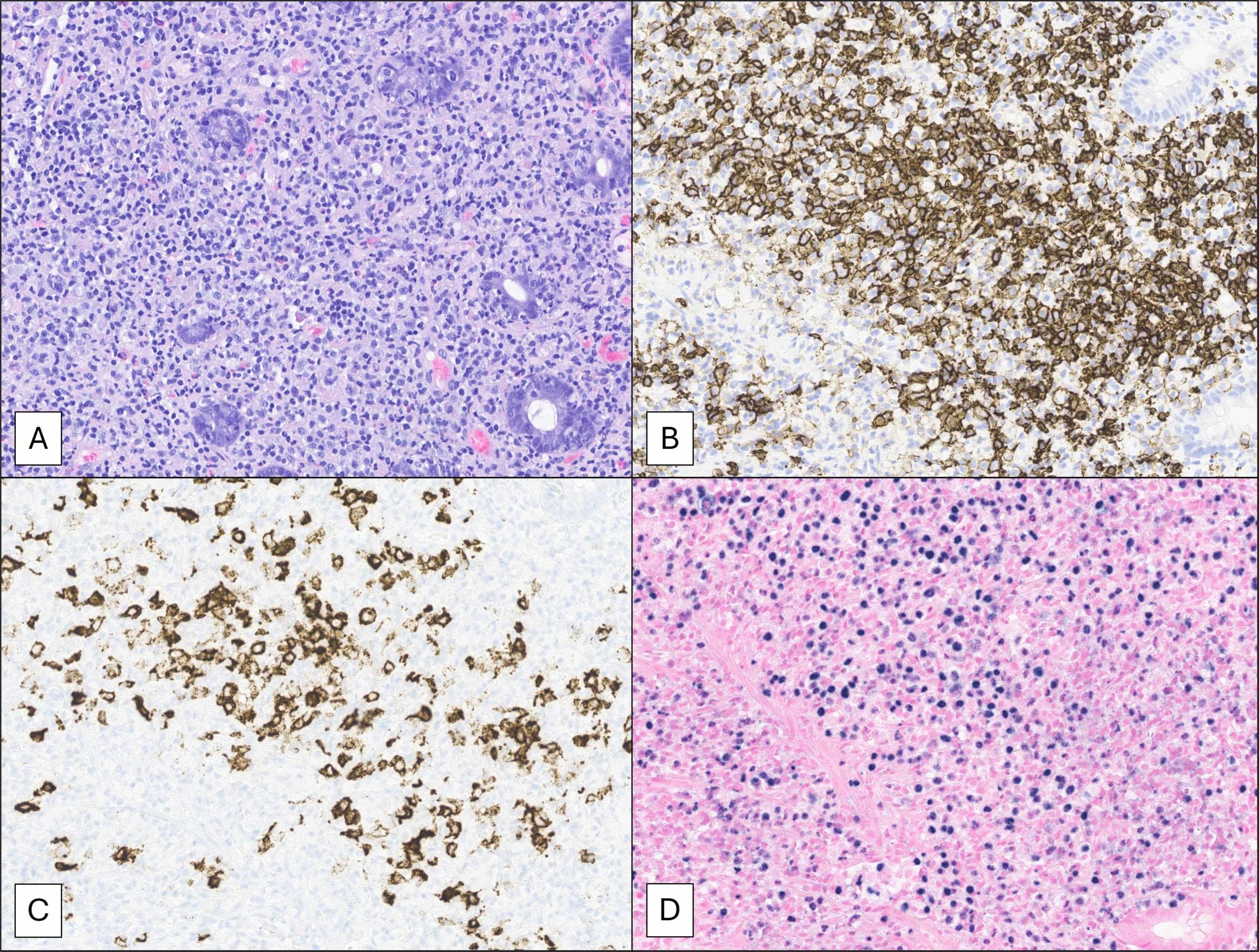Tuesday Poster Session
Category: Colon
P3768 - Post-Transplant Lymphoproliferative Disorder: An Unexpected Cause of Diarrhea 6 Years After Liver Transplant
Tuesday, October 29, 2024
10:30 AM - 4:00 PM ET
Location: Exhibit Hall E

Has Audio

Asrita Vattikonda, MD
Mayo Clinic
Jacksonville, FL
Presenting Author(s)
Asrita Vattikonda, MD, Caroline Olson, MD, Tian Li, MBBS, MS, David Li, MD, Maoyin Pang, MD, PhD
Mayo Clinic, Jacksonville, FL
Introduction: Post-transplant lymphoproliferative disorder (PTLD) is a rare complication of liver transplant and immunosuppression that bears a high mortality rate. This is a unique and unexpected case of PTLD due to onset of symptoms and disease findings in the colon six years after transplant and the patient’s positive EBV serology even prior to transplant.
Case Description/Methods: A 72-year-old female presented with three months of diarrhea associated with abdominal pain and a weight loss of fifteen pounds over five months. Past medical history included orthotopic liver transplantation six years prior for decompensated cirrhosis due to autoimmune hepatitis on tacrolimus. C-reactive protein was elevated at 62.5 mg/L. Stool pathogen panel was negative. Flexible sigmoidoscopy showed normal mucosa from rectum to splenic flexure, and rectosigmoid colon biopsy was consistent with post-transplant lymphoproliferative disorder (PTLD), with Epstein-Barr virus (EBV) polymorphic subtype. EBV level was 1500 U/mL.
The patient was evaluated by oncology and underwent imaging for staging. She was started on weekly rituximab for four doses and her tacrolimus dosage was decreased. She experienced some improvement in diarrhea. Her EBV level decreased to 35 U/mL and repeat imaging showed complete response. Repeat colonoscopy biopsies showed atypical lymphohistiocytic proliferation suggestive of improved but residual PTLD. Given the pathology and persistence of diarrhea, she was treated with another course of rituximab and planned to transition from tacrolimus to sirolimus.
Discussion: PTLD often presents with nonspecific symptoms that can make diagnosis more challenging. The highest risk of PTLD occurs in the first year after transplant, with an average time to diagnosis of 36 months. Patients with negative EBV serology before transplant also have a higher risk. PTLD is usually extranodal in location, with a majority involving the transplanted liver. The gastrointestinal tract is involved in less than 10% of patients. This patient uniquely developed disease in the colon six years after transplant and demonstrated positive EBV serology even prior to transplant. Endoscopy revealed proliferation of lymphocytes, which is the characteristic pathology finding. PTLD is a rare and life-threatening complication of liver transplant that requires a high clinical suspicion to guide workup and lead to diagnosis. Improving clinical awareness can lead to earlier diagnosis and treatment of PTLD and therefore improve outcomes.

Disclosures:
Asrita Vattikonda, MD, Caroline Olson, MD, Tian Li, MBBS, MS, David Li, MD, Maoyin Pang, MD, PhD. P3768 - Post-Transplant Lymphoproliferative Disorder: An Unexpected Cause of Diarrhea 6 Years After Liver Transplant, ACG 2024 Annual Scientific Meeting Abstracts. Philadelphia, PA: American College of Gastroenterology.
Mayo Clinic, Jacksonville, FL
Introduction: Post-transplant lymphoproliferative disorder (PTLD) is a rare complication of liver transplant and immunosuppression that bears a high mortality rate. This is a unique and unexpected case of PTLD due to onset of symptoms and disease findings in the colon six years after transplant and the patient’s positive EBV serology even prior to transplant.
Case Description/Methods: A 72-year-old female presented with three months of diarrhea associated with abdominal pain and a weight loss of fifteen pounds over five months. Past medical history included orthotopic liver transplantation six years prior for decompensated cirrhosis due to autoimmune hepatitis on tacrolimus. C-reactive protein was elevated at 62.5 mg/L. Stool pathogen panel was negative. Flexible sigmoidoscopy showed normal mucosa from rectum to splenic flexure, and rectosigmoid colon biopsy was consistent with post-transplant lymphoproliferative disorder (PTLD), with Epstein-Barr virus (EBV) polymorphic subtype. EBV level was 1500 U/mL.
The patient was evaluated by oncology and underwent imaging for staging. She was started on weekly rituximab for four doses and her tacrolimus dosage was decreased. She experienced some improvement in diarrhea. Her EBV level decreased to 35 U/mL and repeat imaging showed complete response. Repeat colonoscopy biopsies showed atypical lymphohistiocytic proliferation suggestive of improved but residual PTLD. Given the pathology and persistence of diarrhea, she was treated with another course of rituximab and planned to transition from tacrolimus to sirolimus.
Discussion: PTLD often presents with nonspecific symptoms that can make diagnosis more challenging. The highest risk of PTLD occurs in the first year after transplant, with an average time to diagnosis of 36 months. Patients with negative EBV serology before transplant also have a higher risk. PTLD is usually extranodal in location, with a majority involving the transplanted liver. The gastrointestinal tract is involved in less than 10% of patients. This patient uniquely developed disease in the colon six years after transplant and demonstrated positive EBV serology even prior to transplant. Endoscopy revealed proliferation of lymphocytes, which is the characteristic pathology finding. PTLD is a rare and life-threatening complication of liver transplant that requires a high clinical suspicion to guide workup and lead to diagnosis. Improving clinical awareness can lead to earlier diagnosis and treatment of PTLD and therefore improve outcomes.

Figure: H&E sections of the biopsy specimens (A) show colonic mucosa with atypical infiltrate of variably sized lymphocytes with irregular nuclei, histiocytes, and eosinophils. There is abundant glandular destruction and architectural distortion. Immunohistochemical stains show increased CD20 positive B-cells (B) and background CD3 positive T-cells (not pictured). CD30 shows subset positivity (C). EBV (EBER) is positive (D). CD56, CD117, and CMV are negative (not pictured). Findings are consistent with polymorphic lymphoproliferative disorder, EBV+, posttransplant (liver), based on the 5th ed. WHO Classification. All images are at 200x magnification.
Disclosures:
Asrita Vattikonda indicated no relevant financial relationships.
Caroline Olson indicated no relevant financial relationships.
Tian Li indicated no relevant financial relationships.
David Li indicated no relevant financial relationships.
Maoyin Pang indicated no relevant financial relationships.
Asrita Vattikonda, MD, Caroline Olson, MD, Tian Li, MBBS, MS, David Li, MD, Maoyin Pang, MD, PhD. P3768 - Post-Transplant Lymphoproliferative Disorder: An Unexpected Cause of Diarrhea 6 Years After Liver Transplant, ACG 2024 Annual Scientific Meeting Abstracts. Philadelphia, PA: American College of Gastroenterology.
